This article looks at the nature of transgressive fiction, and tackles issues of censorship, including the paradox of themes being permitted for exploration in other genres (such as young fiction and horror) but not in fiction classed as ‘erotic’. It is a  starting point for discussion rather than offering any definitive answers.
starting point for discussion rather than offering any definitive answers.
To learn more about the 130 participants who contributed to debate on these subjects, visit here.
The Nature of Transgression
Erotic literature has traditionally worn a face of transgression, of the defiant questioning of cultural norms, based on the premise that knowledge is to be found by pushing to the edge of experience.
Adrea Kore notes her authorship of erotic fiction as a political act, as well as a creative one. She asserts that finding words for women writing and speaking about their own desire is still seen as taboo in corners of Western culture, let alone in cultures where women are more repressed ideologically, and socially. She stresses, “The political aspect of it, the desire to confront and subvert is a strong motivation for me – as strong as the desire to seduce and arouse.”
Erotic fiction offers not just a dissection of pleasure but of the painful consequences of our actions. We can argue that an exploration of the erotic is best served by striking at what discomforts us, by questioning our assumptions.
Remittance Girl states that, according to Bataille, ‘landscapes of transgression are places of discontinuity’, where our sense of self  ‘becomes disrupted’, through ‘extreme pleasure, pain or mental anguish’. (more here)
‘becomes disrupted’, through ‘extreme pleasure, pain or mental anguish’. (more here)
Jonathan Kemp adds, “For Georges Bataille (and Foucault), transgression was a limit-experience.” [an experience on the edge of limits, where divine horror and divine ecstasy meet, where rules are broken until a place beyond all rules is reached]. He continues, “For Genet it was a slap in the face of the Bourgeoisie; and dependent upon the status quo remaining intact. Arguably, transgression was easier for Bataille and Genet, for they (amongst others) have paved the way for serious, literary attention being paid to the erotic.” Kemp adds that ‘contemporary erotica isn’t necessarily transgressive (for example, Fifty Shades of Grey)’.
Malin James underlines, “While a great deal of erotica falls  into a realistic vein, much of what people actually want is that which they can’t (or don’t feel they can) have in real life. This is why rape fantasies, incest and other transgressive sexual acts continue to sell erotica and generate clicks. The appeal of the forbidden is as old as the Bible, when Eve and the apple laid the foundation for centuries of sexual taboo. The fact is that we get pleasure from doing that which we’re not ‘supposed’ to do… While some taboos have been neutralized by an expanded notion of sex positivity (for the most part, gay couplings, anal and oral sex and extramarital situations don’t pack the transgressive punch they historically have), the amount of incest porn, tentacle porn, bestiality, non-con and various forms of edge play being consumed has risen…” Malin notes that, as such acts are ‘still taboo’, they ‘retain the power to arouse in ways that non-transgressive acts don’t tend to’.
into a realistic vein, much of what people actually want is that which they can’t (or don’t feel they can) have in real life. This is why rape fantasies, incest and other transgressive sexual acts continue to sell erotica and generate clicks. The appeal of the forbidden is as old as the Bible, when Eve and the apple laid the foundation for centuries of sexual taboo. The fact is that we get pleasure from doing that which we’re not ‘supposed’ to do… While some taboos have been neutralized by an expanded notion of sex positivity (for the most part, gay couplings, anal and oral sex and extramarital situations don’t pack the transgressive punch they historically have), the amount of incest porn, tentacle porn, bestiality, non-con and various forms of edge play being consumed has risen…” Malin notes that, as such acts are ‘still taboo’, they ‘retain the power to arouse in ways that non-transgressive acts don’t tend to’.
Janine Ashbless adds, “I’m turned on intellectually and erotically by stepping outside my comfort zone for a little while. A cozy tale of sex between two familiar lovers simply does not do it for me – there has to be tension. So I use my discomforts and my many fears to bring power to my erotic fiction. I challenge myself, and if that means challenging my readers then so much the better.”
Raziel Moore tells us that, when he writes to challenge his reader (or himself), he focuses on either challenging ‘preconceptions’ in how people behave or ‘to expose some raw thing, some ugliness living under my (or your) half buried log, and expose – and wallow in – its fundamental eroticism’. He notes, “I like writing characters at once repulsed and drawn in to some carnal transgression. The various wars between intellect and sensation, mind and body, and the subversion of one by the other in the short or long term is one of my favorite 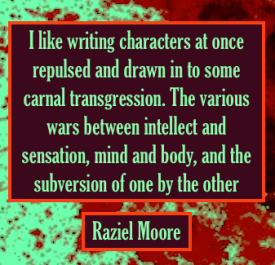 themes. Not only am I turned on by this objectionable thing – I want to think about why I am.”
themes. Not only am I turned on by this objectionable thing – I want to think about why I am.”
Zander Vyne asserts that ‘overturning assumptions’ is far more interesting than writing stories just for ‘fun’. She likes to explore ‘what we think we know’, challenging expectations, with the hope that the reader will ‘emerge with new feelings and understanding… [of] who we, and others, really are’. As she underlines, ‘why write a boring story when you can do all that?’
LN Bey notes, “Great art challenges—our intellect, our beliefs, and most of all our perceptions. With erotica, we have unusual opportunities to look into the human psyche, the human condition, that other genres do not possess.”
Sorcha Black asserts her goal of challenging assumptions about gender roles and sexual attraction by avoiding ‘stereotypes’. She explains, “A lot of my characters are sexually fluid and are also into kink, so I don’t have to limit myself to what’s expected. It’s far too easy to paint caricatures.” Sorcha notes also her portrayal of ‘the subjectivity of good and evil’, and emphasizes how point of view influences our interpretation.
Shanna Germain states, “I’m all about subversion and ninja-sneak-attacks. I want the reader to be so engaged with the story and care so strongly about the characters that they don’t even notice that I’m challenging their assumptions or attempting to stretch their boundaries until it’s all over. I think that it’s very easy for some people to be on the defense if they feel like you’re going to preach at them or try to change their mind about something, and I want them to walk into a story with all their shields down and their hearts exposed.”
Remittance Girl asserts that it is possible to find something morally repugnant and still be fascinated by its psychological ramifications. She refers to Arthur Koestler’s Darkness at Noon, set during the Stalinist Purges of the Soviet Union, which explores the developing relationship between the main character and his interrogator. She notes, “The sustained mental intimacy of one person prying violently into the mind of another produces interesting behaviour patterns. I was interested in exploring the fracturing of the self. Psychological extremes are intimate places.” (more here)
Malin adds, “There is always going to be a difference between what people fantasize about and what they actually do. Transgression and sexual taboo by-pass what many consider to be ‘realistic’ sex and appeal to that portion of sexuality that is driven by fantasy.” She believes transgression to be a driving force in erotica for two reasons: appealing to ‘our attraction to the morally and socially forbidden’; and allowing us, as readers, to ‘dance on the line between fantasy and reality’ in a safe way. She acknowledges the value in creating a ‘grey area’, in which we can examine ‘the tension between social conditioning, morality, transgression and taboo’, exploring ‘what would otherwise bring only repression and shame’.
Inner Limits
In our Western world, fiction including sex scenes is widely available, accepted readily as adult reading material (albeit read discreetly at home, or via Kindle on public transport). Accordingly, very little may be genuinely considered ‘transgressive’, pushing us into zones of discomfort (and thereby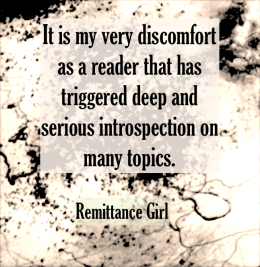 inspiring deeper levels of reflection). This may be why historical erotic fiction is so popular, since the setting more immediately confers a transgressive stance: a feeling of ‘taboo’.
inspiring deeper levels of reflection). This may be why historical erotic fiction is so popular, since the setting more immediately confers a transgressive stance: a feeling of ‘taboo’.
Since our modern society is accepting of most expressions of sexual behaviour, the transgressive perhaps has more significance as an exploration of inner limits (those we place upon ourselves: our own, self-imposed lines in the sand).
Jonathan Kemp tells us, “Homosexuality, which is the form of erotic behaviour my own writing mostly explores, is hardly taboo these days in most circles, so the question becomes how to make it feel transgressive? How to make it work against the norm? In ‘London Triptych’ I chose to write about male prostitutes from different points of view – two from the perspective of rent boys themselves, and one from the perspective of an older man whose sexual repression prevents him from paying for the services of the rent boy he is falling in love with. In the context of the world and characters I was describing, love became transgressive.”
Cari Silverwood highlights the importance of reader point of view, noting that interpretation can vary greatly. Our individual lines in the sand cannot but affect our response to what we read.
Our interest may lie in watching characters struggle and push through their inner-sanctions, and in watching them deal with the consequences: ‘guilt, mistrust, fear and emotional wounding’ as Remittance Girl writes. We see the character obliged to ‘reconstruct their identity in the light of what they’ve done’. (more from RG here)
The fingers of the erotic not only stroke us to pleasure but rend us, exposing our uncertainty and our inconsistencies.
Cari Silverwood tells us, “I try to take readers somewhere they may not have gone before. The unexpected is always in my sights.” She asserts that her stories aim to make us question our ‘relationship with the world and humanity’, to the point where we are ‘uncomfortable and, even, disturbed’. In writing ‘dark fiction’, she believes that ‘there is an inherent moral challenge’. Acknowledging storytelling’s intent to entertain us, she emphasizes her desire to engage readers viscerally, by immersing characters in conflict.
Remittance Girl adds that some of the most moving and thought-provoking writing involves ‘characters presented in extremis’, inviting the reader to consider morally ambiguous questions. She believes, “It is my very discomfort as a reader  that has triggered deep and serious introspection on many topics. These are the books that will stay with me for life.”
that has triggered deep and serious introspection on many topics. These are the books that will stay with me for life.”
In her review of Siri Ousdahl’s Constraint, Remittance Girl states: ‘In order to transgress a law or a taboo, one must recognize the moral authority, the intrinsic value to society, of the law or taboo being broken. Conversely, concepts like consent would have little importance or sacredness for us if they weren’t fragile and vulnerable to profanation. If we had no fear of the taboo of rape, gave no moral authority to the supremacy of consent, this story wouldn’t be truly transgressive.’
We can assert that transgression has no fixed ‘location’. Cecilia Tan, having been writing for many years, notes that the nature of ‘taboo’ has changed greatly. She explains, “Consensual BDSM and bisexuality used to be exotic but they’re now becoming more commonplace.”
Remittance Girl reminds us that DH Lawrence’s Lady Chatterley’s Lover was transgressive because ‘it was socially unacceptable for people of such different classes to have a sexual relationship (especially where the woman was upper class and the man from the working class).’ (more here)
Jonathan Kemp notes that, in ‘Twentysix’, he ‘wanted to explore the romance of promiscuity, the almost-spiritual (for want of a better word) dimension of anonymous encounters’. Kemp explains, “The sexual acts I describe may seem transgressive to some (fisting, watersports, group sex, rimming), but within the context of the sexual subcultures I am representing they are a norm, so the transgression, for me has to come from elsewhere… from how the erotic is represented.“ He explains that he chose to create a ‘narrative transgression’ by using a ‘multi-voiced and multi-valenced prose style…appropriating other registers, other voices’.
Transgression exists only in relation to our sense of ‘norm’, which is shaped by the ideologies we grow up with, by the social expectations placed upon us, by the lines we draw in the sand, for each other and for ourselves.
As Remittance Girl puts it, ‘The hand you push into your pants or under your skirt is stained with the everyday world you live in’. (more here)
Censorship
Jonathan Kemp comments of the ‘twins’ of transgression and taboo, “I might reconfigure them in one body, as two conflicting impulses: action, or restraint.” He imagines censorship, then, as ‘the nanny or governess of this child struggling with a desire to do something and a moral sense or fear that prevents the desire from transgressing into action’. He adds, “Censorship, in a sense, is like the Freudian superego: punitive, disciplinarian, body-hating. Censorship tries to control the transgression of taboos, to hide the body’s excess, its radical jouissance.” [a paradoxical pleasure, reaching an almost intolerable level of excitement].
We might imagine that publishers specialising in erotic fiction would be most open minded, most daring, most willing to ‘push the limits’, offering readers a feast of the surprising. Of course, some are attempting to do so, as far as they believe themselves  able within the limits set by major retailers (we cannot escape the fact that publishers are in business to make money).
able within the limits set by major retailers (we cannot escape the fact that publishers are in business to make money).
However, in many instances, submission guidelines fail to encourage innovation. Rather the reverse. Larger publishers, whom we might imagine are best placed to take the occasional commercial risk, are often most guilty of playing safe, seeking out the same romance tropes and happy-ever-afters.
Siri Ousdahl notes the position of mainstream publishers and retailers, stating that they have a bottom line to consider, so it’s no surprise if they balance potential earnings against risk. As she notes, “The erotic books they’ve embraced in recent years had proven track records online, so the risk hasn’t been significant. When Random House or Penguin ‘take a chance’ on erotica, the works are far from transgressive.”
Publishers and retailers have, largely, taken an extreme stand on the portrayal of sex in fiction, creating their own, arbitrary, list of what is deemed appropriate for readers to encounter, as if the reader were incapable of exercising discernment, or were incapable of processing the words as fiction.
Where does this leave us as authors? Writing repeatedly down the same avenues, afraid to offend, or challenge?
Even independent erotica publishers are prone to request ‘light and fun’ stories, ignoring the huge potential of the genre to take us into the deeper, darker (arguably far more compelling and fulfilling) spaces within the human psyche.
Patrick Califia notes, “I think the difference between commercial, bland ‘erotica’ and radical sex writing is the author’s willingness to challenge limits… Most editors and publishers will refuse to touch the subject of young people and sex, and there is a whole list of other things they won’t put into print as well.”
In fact, publishers regularly reject plots involving extra-marital affairs, or those featuring characters displaying disabilities or who fail to meet general ‘standards’ of attractiveness, or who are older in age. Also ‘unpalatable’ are references to sexual thoughts/acts by or involving characters below the age of 18,  despite the majority of countries worldwide (and the majority of American states) setting the age of consent below 18 years.
despite the majority of countries worldwide (and the majority of American states) setting the age of consent below 18 years.
Coming of Age
Opinions on the appropriateness of telling characters’ sexual stories before they reach the age of 18 are perhaps even more divided than those revolving around non-consent.
‘Coming of Age’ stories are seen as a minefield, since there is no consensus of opinion on the age at which it becomes ‘morally’ acceptable to acknowledge sexual awareness. Is it permissible to describe the sexual thoughts of a 17, 16, 15, 14 or 13 year old? In Young Adult fiction, the answer is yes. Reference may even be made to sexual acts. In any work of literature classified as erotica, the answer is no.
For predominantly commercial reasons, few authors of erotic fiction attempt to write into this sphere. There is no graduating scale of permissibility. Rather, there is an umbrella ban on the mention of anyone under the age of 18 in relation to sexual thoughts or acts (within fiction categorized as ‘erotic’). Within the categorization of erotic fiction, it is a publishing no-no for anyone over the age of 18 to be shown to have sexual thoughts about a character under the age 18, regardless of whether such thoughts are acted upon. In fiction, it appears, thought is as damnable as deed.
This article makes no attempt to provide definitive rules for application. However, as many authors point out, if we may not explore concepts through the inventions of fiction, what avenues remain?
Wade Esley believes, “To ignore this important developmental period is ridiculous and, frankly, dishonest. How can you tell a more honest and heartfelt story than to describe the magic and wonder of experiencing something for the first time? The fear and excitement of venturing into the unknown is fertile ground for developing rich characters and compelling stories.”
Laura Antoniou is among those who express a desire to explore the sexual histories of characters before they reach the age of 18, while Krissy Kneen takes this further, in being keen to delve the psychology behind some people’s compulsion towards sexual acts with those not yet of legal age. She mentions that her latest book (not yet published) ‘takes some small steps towards exploring this area’. She asserts her concern about public reaction. “It is as if we can’t even speak of it,” she comments.
Patrick Califia underlines, “In America, we eroticize youth to an insane extent and yet have draconian punishments for anyone who dares react to all that idealization.” Moreover, he adds, “We’ve become less and less realistic about the sexuality of young people. The penalties for raising these issues are huge and hideous.” As an aside, he notes, “I’ve written only a couple of articles attacking age of consent laws. To all intents and purposes they do not protect young people from abuse. Most molesters of children are family members, not strangers, and the current law enforcement focus ignores this completely. I will keep on talking about this as much as I can because I was abused as a child, and I’m very angry about the way my family’s dysfunction was rationalized or ignored by everyone around us. It took all the strength I had to escape from that world, but I was ill-prepared to leave home, and barely survived the transition from adolescence into adulthood. I think it is a crime that queer children have no mentors, so little help.”
In such cases, where publishers deem particular elements to be ‘non-commercial’, authors have often turned to self-publishing, to allow them to reach readers more freely. However, as is well-known, retailers also impose rules, making their own judgements as to what is ‘appropriate’ reading matter.
Most authors agree that censorship of fiction, in the name of ‘protecting’ readers, is nonsensical. While reading of murder or torture may disturb us (and, we would imagine, rightly and intentionally so) thinking, writing or reading about such acts is not the same as committing them. Rather, reflection on matters of moral dilemma is encouraged as emotionally and intellectually enriching.
The same logic can be applied to the writing of sexual behaviour (even, or especially, where it contravenes the law of whichever country the reader resides in).
Ironically, fiction is the very place in which we are ‘safe’ to explore deeds we would never indulge in real life; it is the realm in which we may muse on all the ‘what ifs’.
Nya Rawlyns states, “My writing is and isn’t me. I channel characters within my imagination. They constantly surprise, shock and delight. Some cause fear, others dismay, a few I  despise. They all answer one question, without hesitation… what if?”
despise. They all answer one question, without hesitation… what if?”
Defending a non-censorship position, Janine Ashbless asserts, “Fiction is a sacred space, where the rules of real life do not apply. It’s a safe area in which to let our darker selves, our fears and our desires, out for a little exercise…”
Of Amazon’s banning of certain subject matter, LN Bey states, “I’m entitled to fantasize whatever the hell I want. No one gets to dictate the ‘propriety’ of my fantasies.” Stressing anger not only as a writer but as a reader, LN declares, “They’re keeping me from reading what I might enjoy. That is simply not their right to do, and I take offense at that… I will read and write what I damn well please.”
Zander Vyne notes that writers are prone to self-censorship through fear of penalty, and laments that, once a book is labelled as ‘banned’ readers’ perceptions become tainted. She stresses, “The censor’s falsehood replaces the writer’s truth.” Zander adds, “At its best, writing is ground-breaking. Revolutionary. Writers should have no barriers to creativity, and no subject should be off-limits.” She urges publishers (and retailers) to be braver, taking more risks, under the knowledge that readers are capable of making their own choices. However, she makes note that, as a mother, she does believe in ‘controlled accessibility for minors, and in the necessity for clear labeling to inform’.
Noting that we should be free to exercise our reading preferences and that it’s important to allow readers to make choices for themselves, LN Bey continues, “Avoiding a work of fiction is different than trying to stop it from existing. We’re in a bizarre age in which sexually explicit material is more available than ever before… but we are also in the age of Taking Offense. And when one Takes Offense, nowadays, one takes full, righteous action—this thing that Offends me cannot exist. “
Double-standards and Lack of Consistency
Regardless of which themes, we, as authors, choose to explore, and which sub-genres of erotica we tend to gravitate towards, we desire to be free to write as we choose, just as we desire to read ‘as we choose’.
Christina Mandara highlights double standards between genres, saying, “You can read all sorts in [the] horror [genre] with rape, incest, axes buried in skulls etc – but non-consensual erotica is frowned upon. I can’t understand why eBook stores are being so censorious in the erotica genre, but not horror.”
Tilly Andrews echoes this, saying, “I could write a very graphic scene of torture and murder for a horror novel and this would not be censored. However, if I add a sexual element and include in an erotic book I am sure that this would be slammed.”
Delores Swallows voices frustration, noting a desire to write a story incorporating plot devices of abduction, torture and murder, and lamenting, “I’m not allowed to include themes like that in erotica – only in the mainstream!” KD Grace raises the same issue, declaring, “I always find it frustrating that those taboos are only in place for erotica writers and don’t apply to any other genre.”
Meanwhile, Remittance Girl notes, “I am free to eroticize staggeringly violent acts, but there’s no publisher that will touch a story about a man who wakes up one morning to find his wife dead, and in a moment of intense grief, has sex with her body one last time.” (more here)
Siri Ousdahl mentions the obvious paradox of our willingness to watch films and television programmes, and read fiction, depicting serial killers, yet our apparent unwillingness to engage with non-consensual sexual acts in fiction. She muses that this may be ‘because many more people are affected by real-life rapists than by real-life serial-killers’.
Ashe Barker tells us, “I wrote a non-con scene in one of my earlier books, and my publisher insisted it be toned down to dub-con. I have never really warmed to the altered version, my first approach was the one I felt was right for those characters. Now, as a more experienced writer and working with a wider range of publishers I might well stick to my guns and either self-pub or find a publisher who shared my vision. I find non-con fascinating and harbour a desire to write something darker than my usual stuff.”
A significant number of readers appear to condemn the writing of such themes (not only non-consent but stories looking at the compulsion towards incest, or sexual themes for under-18s) in the same manner in which they would condemn them as ‘real-life’ acts, rather than recognizing them as themes being explored within fiction.
As Anne Rice notably stated in The Guardian newspaper (2012), we need much more freedom for erotica writers. With particular reference to women, Ms. Rice writes: ‘I’m supportive of equal rights for women, and that includes the right of every woman to write her sexual fantasies and to read books filled with sexual fantasies that she enjoys.’
In the same vein, Christina Mandara notes, “It seems that women, particularly, must have consensual, hearts and flowers stories.”
While accepting that publishers have the right to avoid investing in work they don’t think will sell well, Sorcha Black notes that many of the books named as ‘too graphic or taboo’ are those aimed at women. She believes, “The policing of women’s sexuality still includes censoring what we read.”
Cari Silverwood voices an opinion shared by many authors regarding the lack of consistency in Amazon’s approach to censorship, making particular note of how this is manifested in the seemingly random acceptability of covers.
Shanna Germain asserts the position of publishers and retailers, stating, “I believe that in a free market, publishers and retailers are a business, and they can choose what they do and don’t want to provide as part of that business. To me that’s a business decision, not censorship. They’re not blocking something from being read, they’re just not offering it as part of their business model. As an author, I choose publishers that publish the things that matter to me. As a publisher, I don’t publish material that is racist or homophobic or misogynist. I’m not censoring those books by not publishing them. Someone can buy them elsewhere if that’s their thing, but I am saying, ‘those  books don’t fit my personal beliefs, my business model, or my audience, so I’m not going to publish them’ and that has to be okay.”
books don’t fit my personal beliefs, my business model, or my audience, so I’m not going to publish them’ and that has to be okay.”
However, she adds that, where the market is dominated by a single retailer, the position takes a different slant, since ‘they are potentially blocking all kinds of things from being available’.
Raziel Moore notes the arbitrary and capricious rules of the major retailer(s) but, more significantly, the not-long-past crisis of payment companies refusing to process transactions, effectively blocking independent authors’ sales.
In the genre of ‘Literary Fiction’, it appears that almost anything goes. In the hallowed high-brow halls, are any subjects taboo? There, may even the most transgressive of themes be explored, and their authors applauded for innovation and daring? May incest and non-consent be explored in ‘Women’s Fiction’, necrophilia and extreme violence in ‘Horror’, and coming of age themes in ‘Young Adult’? All are off limits within erotic fiction.
We may debate the propriety of how themes are handled, and the way in which they may be ‘appropriately’ eroticized, but the fact remains that fiction is the realm of imagination. Fiction is not reality: it is a place of reflection and exploration. To write, and read, of what we find unsettling, uncomfortable or disturbing can provide us with valuable opportunities to better know ourselves, and our world.
Further Reading
- You may like to view this post, on the ‘Male/Female Hand’, in which readers are challenged to identify writers’ gender.
- ‘Men Reading Erotic Fiction‘ – looking at why men seek out fiction in this genre, and their preferences for style and content.
- The Erotic Vein: the male pen – on trends in men’s authorship of erotic fiction.
Coming Soon
- Authors’ Recommended Reads
My thanks go to the following authors for giving their time and for their candid answers; my thanks also to authors who contributed their views anonymously.
Special thanks are due to Remittance Girl, whose numerous articles have been my starting point not only for this article, but for the entirety of this survey. Her website is a dazzling treasure chest of insight and challenge.
Tobsha Learner, Laura Antoniou, Susan St. Aubin, Shanna Germain, Remittance Girl, Malin James, Janine Ashbless, Adrea Kore, Kristina Lloyd, Jonathan Kemp, Patrick Califia, Maxim Jakubowski, Cecilia Tan, Donna George Storey, Kathe Koja, Justine Elyot, Raziel Moore, Will Crimson, Sorcha Black, Cari Silverwood, Siri Ousdahl, L.N. Bey, Zander Vane, Tamsin Flowers, Krissy Kneen, Zak Jane Keir, Jade A Waters, Ashley Lister, KD Grace, Kay Jaybee, Nya Rawlyns, Terrance Aldon Shaw, Sessha Batto, Rose Caraway, Allen Dusk, Tabitha Rayne, Marc Angel, Elizabeth Safleur, Jeremy Edwards, Spencer Dryden, Devi Ansevi, Nicholas Tanek, K. L. Shandwick, I.G. Frederick, Jacqui Greaves, Ina Morata, Finn Marlowe, Elsa Holland, Elizabeth Schechter, Aleksandr Voinov, Lucy Felthouse, Alexis Alvarez, R.V. Raiment, J.D. Lexx, Lily Harlem, Thomas Roche, Madeline Moore, Ria Restrepo, Scarlet Darkwood, Wade Esley, Victoria Bliss, Jane Gilbert, Jim Lyon, Charlie Powell, Cate Ellink, Chase Morgan, Lee Savino, C.P. McClennan, Elizabeth Black, C.J. Czelling, Felicity Brandon, Nicolette Hugo, Frank Noir, Amelia Smarts, Nobilis Reed, Sue MacNicol, Cassandra Shaw, Ardent Rose, Sylvia Storm, Renee Rose, Rachel de Vine, Cherry Wild, Patient Lee, Pandora Spocks, Suzette Bohne’ Sommers, Molly Synthia, Charlie Bee, Meg Amor, Lizzie Ashworth, Cara Bristol, Finn Marlowe, C.A. Bell, Brantwijn Serrah, Aubrey Cara, Kathleen Bradean, Jay Willowbay, Stormchase, Lisa Fox, Allyson Young, Vinnie Tesla, Emma Jaye, Dennis Cardiff, Dee Maselle, Frank Lee, Christina Mandara, Big Ed Magussun, Sue Lyndon, T.J. Vermillion, David Flint, Delores Swallows, Vanessa Wu, Ian Smith, Rebecca Branch, Jaye Peaches, Molly Moore, Ashe Barker, Tilly Andrews and Catherine Mazur.

 Janine also names Angela Carter’s Bloody Chamber as an influence on her own short stories, for style and erotic/fairytale subject matter.
Janine also names Angela Carter’s Bloody Chamber as an influence on her own short stories, for style and erotic/fairytale subject matter.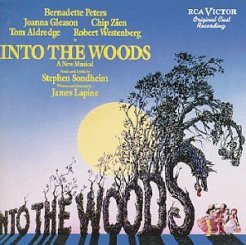 as have Sondheim’s lyrics, which move and inspire her, being ‘clever and emotionally complex’. She enjoys musicals at the tragic end of the spectrum: Cabaret and Jesus Christ Superstar, and Sondheim’s Into the Woods.
as have Sondheim’s lyrics, which move and inspire her, being ‘clever and emotionally complex’. She enjoys musicals at the tragic end of the spectrum: Cabaret and Jesus Christ Superstar, and Sondheim’s Into the Woods.
 When Milja Petak released the fallen angel Azazel from five thousand years of imprisonment, she did it out of love and pity. She found herself in a passionate sexual relationship beyond her imagining and control – the beloved plaything of a dark and furious demon who takes what he wants, when he wants, and submits to no restraint. But what she hasn’t bargained on is being drawn into his plan to free all his incarcerated brothers and wage a war against the Powers of Heaven.
When Milja Petak released the fallen angel Azazel from five thousand years of imprisonment, she did it out of love and pity. She found herself in a passionate sexual relationship beyond her imagining and control – the beloved plaything of a dark and furious demon who takes what he wants, when he wants, and submits to no restraint. But what she hasn’t bargained on is being drawn into his plan to free all his incarcerated brothers and wage a war against the Powers of Heaven. imprison Azazel for all eternity.
imprison Azazel for all eternity. You may like to visit Janine’s website
You may like to visit Janine’s website
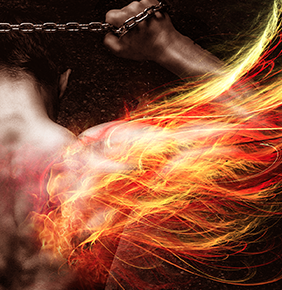
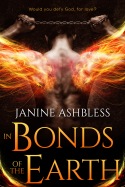 the Watchers trilogy: In Bonds of the Earth. It’s a thought-provoking and immersive novel, setting new standards for paranormal erotic romance. Janine’s authorial style is unforgettable. She likes to write about magic, myth and mystery, dangerous power dynamics, borderline terror, and the not-quite-human. She takes exciting risks in her storytelling; she’s innovative, and she brings fierce intelligence to all she writes.
the Watchers trilogy: In Bonds of the Earth. It’s a thought-provoking and immersive novel, setting new standards for paranormal erotic romance. Janine’s authorial style is unforgettable. She likes to write about magic, myth and mystery, dangerous power dynamics, borderline terror, and the not-quite-human. She takes exciting risks in her storytelling; she’s innovative, and she brings fierce intelligence to all she writes. 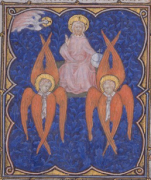 “Stretching up into the great vertical space of the tower, they had become a living helix of light—a caduceus coiled about the pillar of the world. I thought of all the legends from across the Earth. I thought of the Garden of Eden and the Great Dragon of Saint John’s Revelation; stories bookending the whole of human history.
“Stretching up into the great vertical space of the tower, they had become a living helix of light—a caduceus coiled about the pillar of the world. I thought of all the legends from across the Earth. I thought of the Garden of Eden and the Great Dragon of Saint John’s Revelation; stories bookending the whole of human history.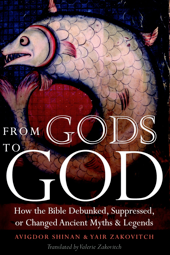 with hands (remember that the Serpent of Eden is punished by being made to crawl in the dust, strongly suggested that it previously had other forms of locomotion).
with hands (remember that the Serpent of Eden is punished by being made to crawl in the dust, strongly suggested that it previously had other forms of locomotion).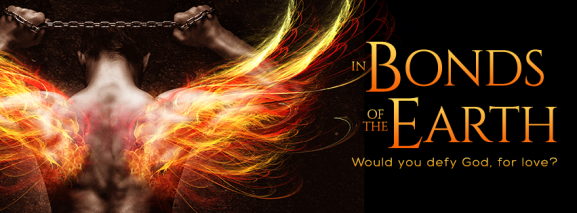
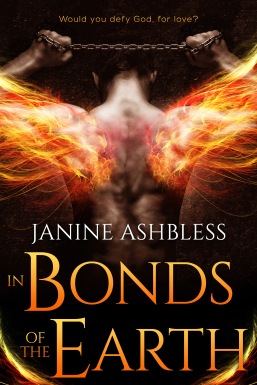 “Broad at the shoulders and lean at the hips, six foot-and-then-something of ropey muscle, he looks like a Spartan god who got lost in a thrift store. He moves like ink through water. And his eyes, when you get a good look at them, are silver. Not gray. Silver. You might take their inhuman shine for fancy contact lenses. You’d be wrong.” – In Bonds of the Earth
“Broad at the shoulders and lean at the hips, six foot-and-then-something of ropey muscle, he looks like a Spartan god who got lost in a thrift store. He moves like ink through water. And his eyes, when you get a good look at them, are silver. Not gray. Silver. You might take their inhuman shine for fancy contact lenses. You’d be wrong.” – In Bonds of the Earth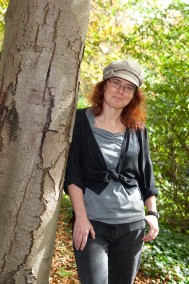

 I
I Always this dance, and writing has helped me embrace the totality in the supposed contradictions.’ – read more
Always this dance, and writing has helped me embrace the totality in the supposed contradictions.’ – read more  Others discovered the liberation of writing much later.
Others discovered the liberation of writing much later.





 Christina Mandara voices the opinion that women’s reading material is being dictated to them: a view shared by Sorcha Black, who believes, “The policing of women’s sexuality includes censoring what we read.”
Christina Mandara voices the opinion that women’s reading material is being dictated to them: a view shared by Sorcha Black, who believes, “The policing of women’s sexuality includes censoring what we read.” Remittance Girl, in her article,
Remittance Girl, in her article, 
 However, the majority of writers with the 130 authors survey assert a desire to write recognizable, diverse characters, and situations, with psychological depth, to better allow readers to empathize, and enter into alternate possibilities.
However, the majority of writers with the 130 authors survey assert a desire to write recognizable, diverse characters, and situations, with psychological depth, to better allow readers to empathize, and enter into alternate possibilities. (where the plot extends beyond the surprise reveal of them actually being a §transperson). She laments the ‘generic’ in erotic fiction.
(where the plot extends beyond the surprise reveal of them actually being a §transperson). She laments the ‘generic’ in erotic fiction. experience is fantastic even though you don’t know his/her name. The female version usually has the gorgeous partner falling in love for the first time in his life after the aforementioned great sex.” Donna asserts, “I’d like to see more celebration of the magic of sex between people who know each other well. I’d like to acknowledge that time and trust are important in creating a situation where great sex can happen. Couples who’ve been together for a long time are not necessarily bored with each other. They can go deeper, they can play, they know each other well enough to trust it will be mutually enjoyable.”
experience is fantastic even though you don’t know his/her name. The female version usually has the gorgeous partner falling in love for the first time in his life after the aforementioned great sex.” Donna asserts, “I’d like to see more celebration of the magic of sex between people who know each other well. I’d like to acknowledge that time and trust are important in creating a situation where great sex can happen. Couples who’ve been together for a long time are not necessarily bored with each other. They can go deeper, they can play, they know each other well enough to trust it will be mutually enjoyable.”  mistrust, fear and emotional wounding’ — shows characters obliged to ‘reconstruct their identity in the light of what they’ve done’ –more
mistrust, fear and emotional wounding’ — shows characters obliged to ‘reconstruct their identity in the light of what they’ve done’ –more 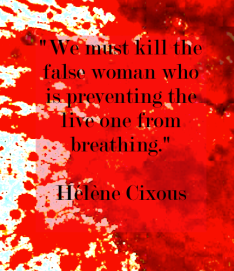 “I love exploring the slippery relationship between truth and fiction. The stories I value convey truths that spring from careful thought and deep feeling, truths we often keep secret from others and ourselves. Exploring those truths is what I aim for when I write.”
“I love exploring the slippery relationship between truth and fiction. The stories I value convey truths that spring from careful thought and deep feeling, truths we often keep secret from others and ourselves. Exploring those truths is what I aim for when I write.” She adds that the public versus private face of a person can exist not only in terms of their sexuality (how they express it to the world versus how they are in private) but their art form (dance, painting, sculpture, music, songwriting, writing, and so on).
She adds that the public versus private face of a person can exist not only in terms of their sexuality (how they express it to the world versus how they are in private) but their art form (dance, painting, sculpture, music, songwriting, writing, and so on). Themes: Mortality
Themes: Mortality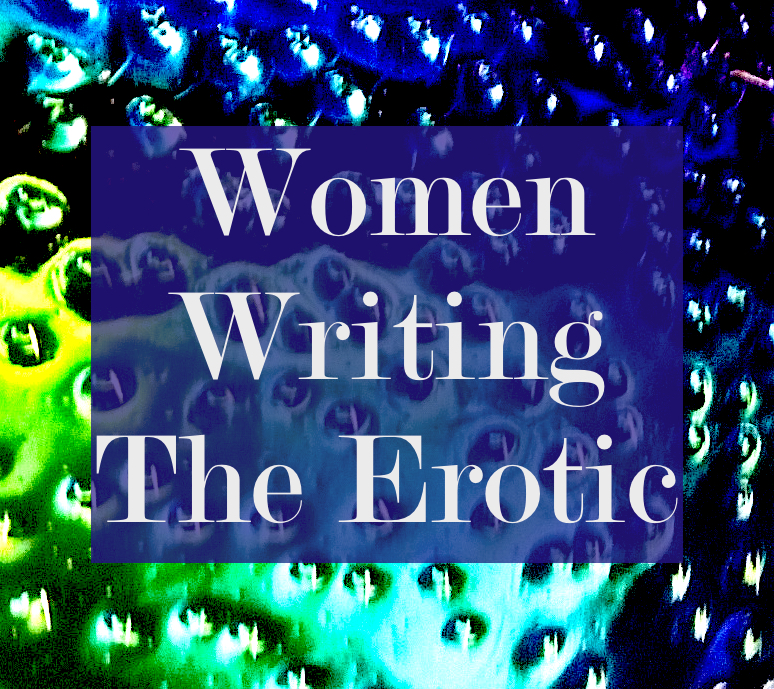
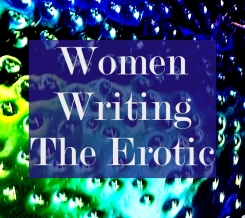
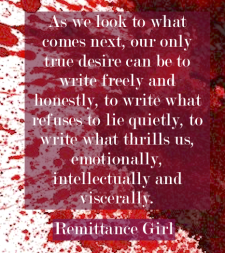 share of authors, and our voices are growing louder.
share of authors, and our voices are growing louder.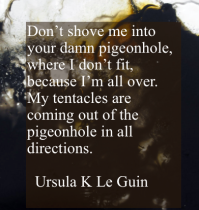 There’s still a degree of censorship, and traditional publishers remain somewhat cautious about stepping outside of the box, but, if we keep writing up against the boundaries, inch by inch, they will surely come down.
There’s still a degree of censorship, and traditional publishers remain somewhat cautious about stepping outside of the box, but, if we keep writing up against the boundaries, inch by inch, they will surely come down.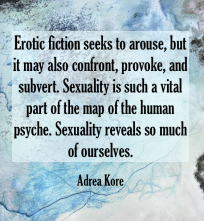
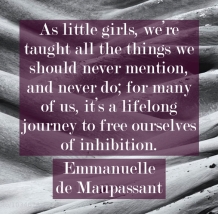 It’s true that some elements of the human condition are universal. We all, surely, know what it is to love, to despair, to smile, or to regret. We know the fragility of life and we share wonder in the world we inhabit.
It’s true that some elements of the human condition are universal. We all, surely, know what it is to love, to despair, to smile, or to regret. We know the fragility of life and we share wonder in the world we inhabit.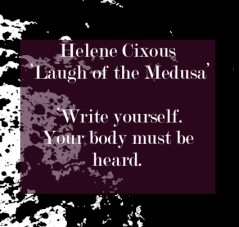 As Cecilia Tan states, “I was put on Earth to write but it wasn’t until I started writing erotic fiction that I found my voice. I want a world where sexual freedom, not sexual oppression, is the norm, and so I write about sexual pleasure and fulfillment.”
As Cecilia Tan states, “I was put on Earth to write but it wasn’t until I started writing erotic fiction that I found my voice. I want a world where sexual freedom, not sexual oppression, is the norm, and so I write about sexual pleasure and fulfillment.”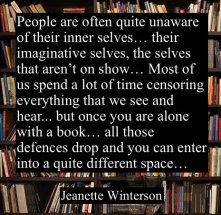 as well as a creative one’. She explains, “French feminist Helene Cixous phrased it beautifully in an essay called ‘Laugh of the Medusa’ – ‘Write yourself. Your body must be heard.’ I think this applies to all women’s stories, but particularly those around sexuality. The political aspect of it, the desire to confront and subvert, is a strong motivation for me – as strong as the desire to seduce and arouse.”
as well as a creative one’. She explains, “French feminist Helene Cixous phrased it beautifully in an essay called ‘Laugh of the Medusa’ – ‘Write yourself. Your body must be heard.’ I think this applies to all women’s stories, but particularly those around sexuality. The political aspect of it, the desire to confront and subvert, is a strong motivation for me – as strong as the desire to seduce and arouse.”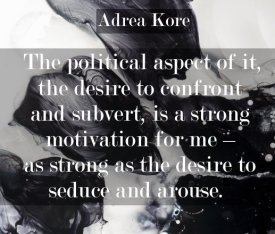 that some readers have criticized her writing of female protagonists who lack ‘the same moral compass’ as themselves. She notes, “I call these cardboard cut out heroines. From my personal experience, people make crazy decisions when it comes to love and passion.” She asserts that ‘flawed, impulsive, manipulative heroines’ breathe life into fiction.
that some readers have criticized her writing of female protagonists who lack ‘the same moral compass’ as themselves. She notes, “I call these cardboard cut out heroines. From my personal experience, people make crazy decisions when it comes to love and passion.” She asserts that ‘flawed, impulsive, manipulative heroines’ breathe life into fiction.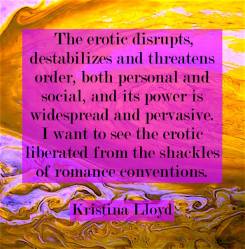 some authors mention a desire to explore the realm of non-consent.
some authors mention a desire to explore the realm of non-consent.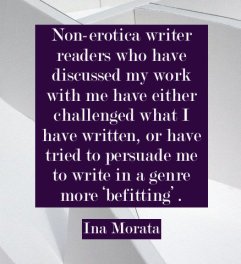 preoccupy myself with it as I write would be to stymie the story before it’s even formed. While I acknowledge the reality of censorship, I try not to let it, or fear of it, influence my writing. I serve the story. If it trips censors, so be it. I have the luxury of pulling it and sending it elsewhere.“
preoccupy myself with it as I write would be to stymie the story before it’s even formed. While I acknowledge the reality of censorship, I try not to let it, or fear of it, influence my writing. I serve the story. If it trips censors, so be it. I have the luxury of pulling it and sending it elsewhere.“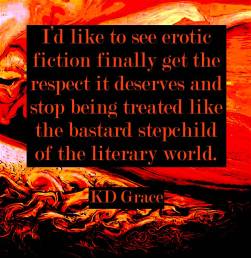 However, KD Grace stresses that this generates an attitude of ‘us against the world and circle the wagons’ and ‘a real sense of camaraderie among erotica writers (with little of the petty jealousy I’ve seen among writers in some other genres).’ She feels the erotica writing community as ‘a family’, saying, “That encouragement has meant a lot to me through the years.”
However, KD Grace stresses that this generates an attitude of ‘us against the world and circle the wagons’ and ‘a real sense of camaraderie among erotica writers (with little of the petty jealousy I’ve seen among writers in some other genres).’ She feels the erotica writing community as ‘a family’, saying, “That encouragement has meant a lot to me through the years.”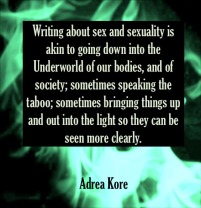 desire. I think it put light on the seed already in me to find new and evocative ways of writing about feminine desire and describing the desiring female body.”
desire. I think it put light on the seed already in me to find new and evocative ways of writing about feminine desire and describing the desiring female body.”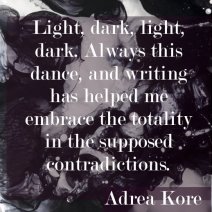 thing that truly inspires me to silence the inner critic and just write and enjoy the pleasure of speaking the unspeakable.”
thing that truly inspires me to silence the inner critic and just write and enjoy the pleasure of speaking the unspeakable.”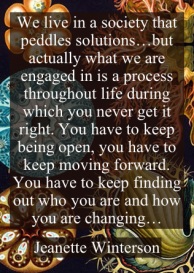 and our fears. We emerge changed and, as RG tells us, we ‘expose something true’ of ourselves (more
and our fears. We emerge changed and, as RG tells us, we ‘expose something true’ of ourselves (more 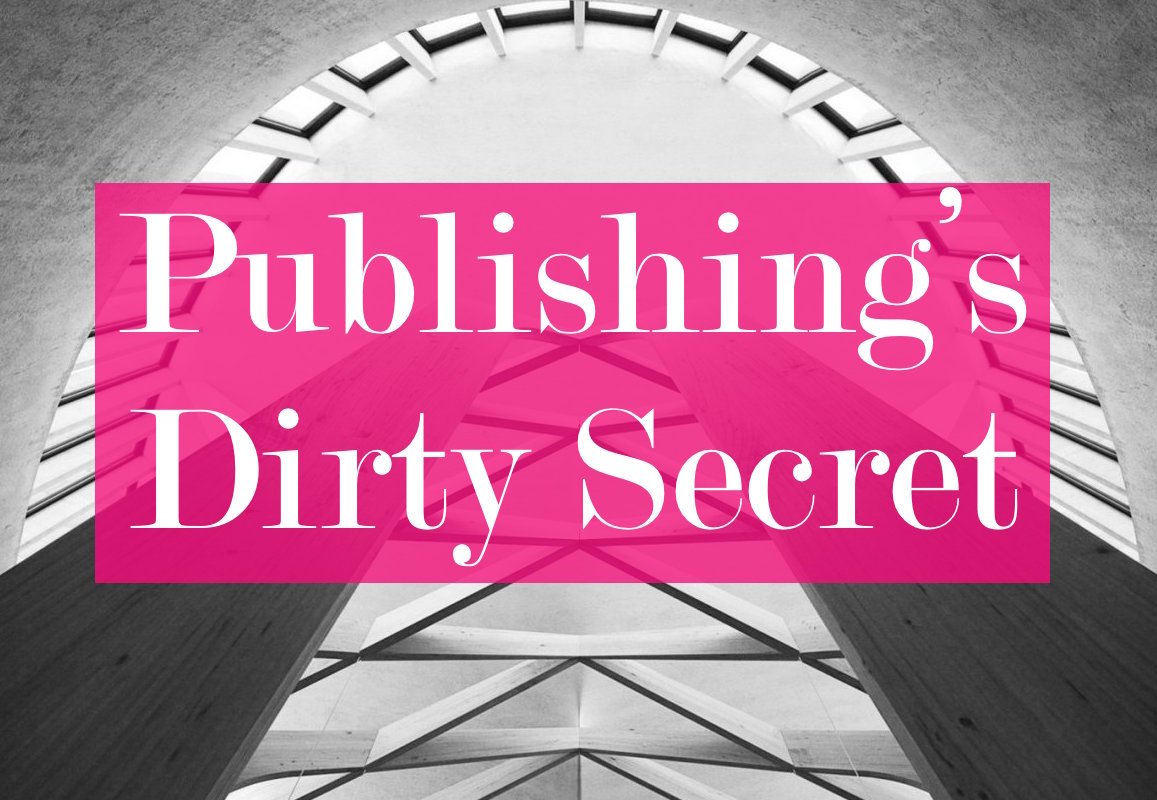
 Having interviewed just over
Having interviewed just over 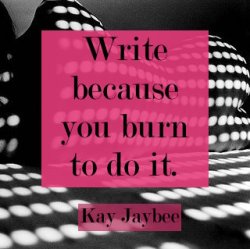 was so much poorly written erotica. How hard could it be to climb to the top of that dung heap? However, the more I read, the more I discovered truly talented writers, and became determined to write quality stories myself.”
was so much poorly written erotica. How hard could it be to climb to the top of that dung heap? However, the more I read, the more I discovered truly talented writers, and became determined to write quality stories myself.” drawing of two pricks. The editor of the volume asked me to remove the phrase.” He felt obliged to concede, being a young academic and this being his first publication. He asserts that he would not do so today.
drawing of two pricks. The editor of the volume asked me to remove the phrase.” He felt obliged to concede, being a young academic and this being his first publication. He asserts that he would not do so today. only benefit of a publisher is the promise of reviews, which many small presses don’t bother to solicit.”
only benefit of a publisher is the promise of reviews, which many small presses don’t bother to solicit.”  horror novel through a small press. It was a disaster. There was so little editorial work done that it went on sale within a week of me submitting it. I should have smelled a rat. They did no promo and the company quickly went bust.”
horror novel through a small press. It was a disaster. There was so little editorial work done that it went on sale within a week of me submitting it. I should have smelled a rat. They did no promo and the company quickly went bust.”  with ‘publishing’ in that sentence.”
with ‘publishing’ in that sentence.” books visible’. She asserts, “My advice to new authors would be to ensure you have built a brand before you set out. Know the image you’d like to portray to your followers and work hard to build on what you’ve achieved.” She also warns against expecting ‘instant success’.
books visible’. She asserts, “My advice to new authors would be to ensure you have built a brand before you set out. Know the image you’d like to portray to your followers and work hard to build on what you’ve achieved.” She also warns against expecting ‘instant success’. 
 where ideas may be further debated, and professional expertise shared, you may like to visit the
where ideas may be further debated, and professional expertise shared, you may like to visit the 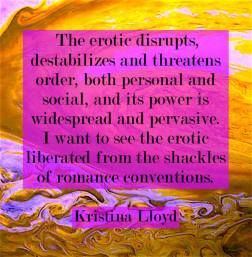 unsurprisingly, apt to denigrate erotic fiction as no more than ‘poorly written filth’.
unsurprisingly, apt to denigrate erotic fiction as no more than ‘poorly written filth’. in their craft, including through editing “I‘d like to see better editing, with consumer dollars following the well-groomed and thoughtful written word.”
in their craft, including through editing “I‘d like to see better editing, with consumer dollars following the well-groomed and thoughtful written word.” disappointed on coming across a book labelled as ‘erotica’, which does not meet their expectations for romantic elements. Meanwhile, erotic fiction authors may be ‘judged’ (and reviewed critically) against criteria they have never attempted to meet.
disappointed on coming across a book labelled as ‘erotica’, which does not meet their expectations for romantic elements. Meanwhile, erotic fiction authors may be ‘judged’ (and reviewed critically) against criteria they have never attempted to meet. men’s writing on the topics of relationships and sex is more often respected, being lauded for insight into human nature and named as literary fiction, while women’s work on the same topics is more generally dismissed. She states, “Romance has a bad reputation as being sub-par… as if what women choose to read isn’t as respectable or reputable as what men choose. The aggravating thing is that when women write about relationships and sex (romance novels), their books are viewed by some with disdain or disinterest. But when a man writes about the same topics, his books are viewed with great respect. He’s said to have great insight into human nature. His books are often lifted out of the romance genre and placed in literary fiction, which some view as having more clout. Women’s voices and insights matter.”
men’s writing on the topics of relationships and sex is more often respected, being lauded for insight into human nature and named as literary fiction, while women’s work on the same topics is more generally dismissed. She states, “Romance has a bad reputation as being sub-par… as if what women choose to read isn’t as respectable or reputable as what men choose. The aggravating thing is that when women write about relationships and sex (romance novels), their books are viewed by some with disdain or disinterest. But when a man writes about the same topics, his books are viewed with great respect. He’s said to have great insight into human nature. His books are often lifted out of the romance genre and placed in literary fiction, which some view as having more clout. Women’s voices and insights matter.” are commercially risk-averse, serving up what they believe audiences wish to consume. The situation has become, largely, a self-perpetuating loop, of authors creating works within a ‘safe’ and market-proven zone.
are commercially risk-averse, serving up what they believe audiences wish to consume. The situation has become, largely, a self-perpetuating loop, of authors creating works within a ‘safe’ and market-proven zone. it shapes our thoughts’. Siri Ousdahl states, “I’d like there to be a larger place for high-quality, graphic sex writing: fiction that is not coy, does not romanticize or trivialize, and is psychologically realistic.”
it shapes our thoughts’. Siri Ousdahl states, “I’d like there to be a larger place for high-quality, graphic sex writing: fiction that is not coy, does not romanticize or trivialize, and is psychologically realistic.” of hiding and downplaying erotica’. As Elizabeth Safleur puts it, “It’d be nice if Amazon didn’t bury our titles.”
of hiding and downplaying erotica’. As Elizabeth Safleur puts it, “It’d be nice if Amazon didn’t bury our titles.”
 starting point for discussion rather than offering any definitive answers.
starting point for discussion rather than offering any definitive answers. ‘becomes disrupted’, through ‘extreme pleasure, pain or mental anguish’. (more
‘becomes disrupted’, through ‘extreme pleasure, pain or mental anguish’. (more  into a realistic vein, much of what people actually want is that which they can’t (or don’t feel they can) have in real life. This is why rape fantasies, incest and other transgressive sexual acts continue to sell erotica and generate clicks. The appeal of the forbidden is as old as the Bible, when Eve and the apple laid the foundation for centuries of sexual taboo. The fact is that we get pleasure from doing that which we’re not ‘supposed’ to do… While some taboos have been neutralized by an expanded notion of sex positivity (for the most part, gay couplings, anal and oral sex and extramarital situations don’t pack the transgressive punch they historically have), the amount of incest porn, tentacle porn, bestiality, non-con and various forms of edge play being consumed has risen…” Malin notes that, as such acts are ‘still taboo’, they ‘retain the power to arouse in ways that non-transgressive acts don’t tend to’.
into a realistic vein, much of what people actually want is that which they can’t (or don’t feel they can) have in real life. This is why rape fantasies, incest and other transgressive sexual acts continue to sell erotica and generate clicks. The appeal of the forbidden is as old as the Bible, when Eve and the apple laid the foundation for centuries of sexual taboo. The fact is that we get pleasure from doing that which we’re not ‘supposed’ to do… While some taboos have been neutralized by an expanded notion of sex positivity (for the most part, gay couplings, anal and oral sex and extramarital situations don’t pack the transgressive punch they historically have), the amount of incest porn, tentacle porn, bestiality, non-con and various forms of edge play being consumed has risen…” Malin notes that, as such acts are ‘still taboo’, they ‘retain the power to arouse in ways that non-transgressive acts don’t tend to’.  themes. Not only am I turned on by this objectionable thing – I want to think about why I am.”
themes. Not only am I turned on by this objectionable thing – I want to think about why I am.” inspiring deeper levels of reflection). This may be why historical erotic fiction is so popular, since the setting more immediately confers a transgressive stance: a feeling of ‘taboo’.
inspiring deeper levels of reflection). This may be why historical erotic fiction is so popular, since the setting more immediately confers a transgressive stance: a feeling of ‘taboo’. that has triggered deep and serious introspection on many topics. These are the books that will stay with me for life.”
that has triggered deep and serious introspection on many topics. These are the books that will stay with me for life.”  able within the limits set by major retailers (we cannot escape the fact that publishers are in business to make money).
able within the limits set by major retailers (we cannot escape the fact that publishers are in business to make money). despite the majority of countries worldwide (and the majority of American states) setting the age of consent below 18 years.
despite the majority of countries worldwide (and the majority of American states) setting the age of consent below 18 years. despise. They all answer one question, without hesitation… what if?”
despise. They all answer one question, without hesitation… what if?” books don’t fit my personal beliefs, my business model, or my audience, so I’m not going to publish them’ and that has to be okay.”
books don’t fit my personal beliefs, my business model, or my audience, so I’m not going to publish them’ and that has to be okay.” 
 with friends and family and how far we keep separate our ‘writing identity’, to avoid social stigmatization.
with friends and family and how far we keep separate our ‘writing identity’, to avoid social stigmatization. avoid ‘judgement’, not just from co-workers or neighbours, but from family and friends, or to avoid negative consequences for those they love.
avoid ‘judgement’, not just from co-workers or neighbours, but from family and friends, or to avoid negative consequences for those they love. Although the journey continues, we’ve come a long way in embracing equality of rights across sexual orientation, race and gender. And yet, whatever their ‘secret’ reading habits, some members of the public draw the line at rubbing shoulders with writers of what many term ‘filth’.
Although the journey continues, we’ve come a long way in embracing equality of rights across sexual orientation, race and gender. And yet, whatever their ‘secret’ reading habits, some members of the public draw the line at rubbing shoulders with writers of what many term ‘filth’. As Spencer Dryden notes: “If my friends, family and associates learned of my interest in erotica, they would drop dead in horror, so I use a pen name.
As Spencer Dryden notes: “If my friends, family and associates learned of my interest in erotica, they would drop dead in horror, so I use a pen name. agent who essentially said, ‘Yuck, don’t contact me again’.”
agent who essentially said, ‘Yuck, don’t contact me again’.”  of my family, but this has been exacerbated by my choice to write erotica. Indeed, I was told I should concentrate my energies ‘on something much better’ after I published my last book. The person involved hadn’t even read the book, and had no idea that, aside from the power play through the sex, it broached some serious subjects that have been prevalent in my family for decades, and that there was more to consider than which pages to bookmark and show their friends in secret! My children never cease to amaze me, though: they have just accepted what I write and are interested in me as a writer, regardless of genre. In fact, my daughter seems to find it pretty cool that I write erotica.”
of my family, but this has been exacerbated by my choice to write erotica. Indeed, I was told I should concentrate my energies ‘on something much better’ after I published my last book. The person involved hadn’t even read the book, and had no idea that, aside from the power play through the sex, it broached some serious subjects that have been prevalent in my family for decades, and that there was more to consider than which pages to bookmark and show their friends in secret! My children never cease to amaze me, though: they have just accepted what I write and are interested in me as a writer, regardless of genre. In fact, my daughter seems to find it pretty cool that I write erotica.”

 particularly through dreams.” Jay Willowbay adds his belief that ‘any erotic author that doesn’t mine their own fantasies is ignoring their most bountiful source of vivid and exciting material, and letting it go to waste’. Cari Silverwood continues this train of thought, saying that, if we neglect to use our fantasies we’re unlikely to write scenes which ‘resonate’. Tamsin Flowers comments that fantasies feed into her work ‘either explicitly or less directly, lending shade and nuance’.
particularly through dreams.” Jay Willowbay adds his belief that ‘any erotic author that doesn’t mine their own fantasies is ignoring their most bountiful source of vivid and exciting material, and letting it go to waste’. Cari Silverwood continues this train of thought, saying that, if we neglect to use our fantasies we’re unlikely to write scenes which ‘resonate’. Tamsin Flowers comments that fantasies feed into her work ‘either explicitly or less directly, lending shade and nuance’. Tabitha Rayne also asserts that personal fantasies are the engine behind her writing, saying, “No matter what I write, in that moment, it is my desire. It is absolutely my fantasy.” She notes that what stirs her one day can be very different the next.
Tabitha Rayne also asserts that personal fantasies are the engine behind her writing, saying, “No matter what I write, in that moment, it is my desire. It is absolutely my fantasy.” She notes that what stirs her one day can be very different the next. The key word here is ‘fantasy’. The very act of fantasizing allows us to control the details; we are pulling all the strings. Those fantasies are of our choosing, and we inwardly narrate them just the way we decide upon. This is not to say that writers, or readers, who enjoy the fantasy of ‘forced seduction’ are complacent regarding the brutal crime of rape. The fictional-fantasy world of ravishment is a different beast to real-life sexual assault.
The key word here is ‘fantasy’. The very act of fantasizing allows us to control the details; we are pulling all the strings. Those fantasies are of our choosing, and we inwardly narrate them just the way we decide upon. This is not to say that writers, or readers, who enjoy the fantasy of ‘forced seduction’ are complacent regarding the brutal crime of rape. The fictional-fantasy world of ravishment is a different beast to real-life sexual assault. must have consensual, hearts and flowers stories. I can’t understand why eBook stores are being so censorious in the erotica genre, but not horror.”
must have consensual, hearts and flowers stories. I can’t understand why eBook stores are being so censorious in the erotica genre, but not horror.” writing but I also want fiction to be an uninhibited, imaginative space where we can follow characters who are dangerous, or who are in jeopardy, or suffering, or who have unsanctioned desires. These wishes often pull in contrary directions. In erotica, non-con acts are often set within a framework of consent (as in BDSM practice or fantasy role-play) to indicate that the scenario is not real. However, this usually reduces the blood-pumping thrill for me as a reader.”
writing but I also want fiction to be an uninhibited, imaginative space where we can follow characters who are dangerous, or who are in jeopardy, or suffering, or who have unsanctioned desires. These wishes often pull in contrary directions. In erotica, non-con acts are often set within a framework of consent (as in BDSM practice or fantasy role-play) to indicate that the scenario is not real. However, this usually reduces the blood-pumping thrill for me as a reader.”  We can safely assume that those featuring aliens, dinosaurs, yetis, vampires, werewolves and other monstrous and supernatural beasts are likely to spring from the imagination rather than from real life encounters, with the same logic applied to stories of pirates and Vikings and all manner of historical or ‘fantasy’ settings.
We can safely assume that those featuring aliens, dinosaurs, yetis, vampires, werewolves and other monstrous and supernatural beasts are likely to spring from the imagination rather than from real life encounters, with the same logic applied to stories of pirates and Vikings and all manner of historical or ‘fantasy’ settings. encourage people to examine their assumptions about sexuality and live closer to the edge.”
encourage people to examine their assumptions about sexuality and live closer to the edge.” ‘what would otherwise bring only repression and shame’.
‘what would otherwise bring only repression and shame’.

 they’re struggling or uncertain or scared. One that says, ‘Look, everyone’s been there. Everyone’s failed.’”
they’re struggling or uncertain or scared. One that says, ‘Look, everyone’s been there. Everyone’s failed.’” gloriously, or succeeded but had to make sacrifices. These are elements I enjoy exploring in my erotica.”
gloriously, or succeeded but had to make sacrifices. These are elements I enjoy exploring in my erotica.” calls them: to the small lies we tell ourselves, to our unspoken motivations, to the ways in which we manipulate or make use of others.
calls them: to the small lies we tell ourselves, to our unspoken motivations, to the ways in which we manipulate or make use of others. Madeline Moore echoes this, saying, “Many of my ideas could be erotica or horror, depending on the way I twist the tale. I find it interesting that it’s so easy to see a concept going in either direction. I wonder if there’s always a horrifying aspect to sex; or a sexual aspect to horror. Adrenalin is adrenalin, after all; same physical experience interpreted in different ways. It’s all in the mind.”
Madeline Moore echoes this, saying, “Many of my ideas could be erotica or horror, depending on the way I twist the tale. I find it interesting that it’s so easy to see a concept going in either direction. I wonder if there’s always a horrifying aspect to sex; or a sexual aspect to horror. Adrenalin is adrenalin, after all; same physical experience interpreted in different ways. It’s all in the mind.” our compulsions, the dichotomy of pain versus pleasure, and the enigma of sexual connection as the route to ‘loss of self’.
our compulsions, the dichotomy of pain versus pleasure, and the enigma of sexual connection as the route to ‘loss of self’.
 about my own sexuality and desire. Writing has given me an understanding; it has allowed me to own a sexuality I’d been conflicted about and confused by when I was younger.”
about my own sexuality and desire. Writing has given me an understanding; it has allowed me to own a sexuality I’d been conflicted about and confused by when I was younger.”  into worlds that are foreign and slightly magical or dangerous, or squalid… I don’t look for identification in the fiction I read, I look for difference…”
into worlds that are foreign and slightly magical or dangerous, or squalid… I don’t look for identification in the fiction I read, I look for difference…”
 On inviting authors to share their thoughts regarding writing ‘the erotic’, I couldn’t have imagined that so many would respond, nor that they would answer with such honestly. To find out more about them, click
On inviting authors to share their thoughts regarding writing ‘the erotic’, I couldn’t have imagined that so many would respond, nor that they would answer with such honestly. To find out more about them, click  Sometimes, the revelatory urge to write in this way can come as a huge surprise to the author, as if characters have turned wayward, leading us down a path hitherto hidden.
Sometimes, the revelatory urge to write in this way can come as a huge surprise to the author, as if characters have turned wayward, leading us down a path hitherto hidden. she later recognized as being ‘paranormal erotica’. She notes, “It just needed me to discover the genre and realize there was an outlet!”
she later recognized as being ‘paranormal erotica’. She notes, “It just needed me to discover the genre and realize there was an outlet!” Adrea tells us, “What I most felt drawn to reading was the feminine experience of the world, and stories of growth, transformation or dislocation, felt through and mediated by the body. These were the things that I began to write about: Love and longing. Loss. Translating the physical arts I most loved into words: my experiences of dancing and life-modelling. Then, more arduously, carving out narratives of sexual trauma. Death. Then, the sensual pleasures. Sex. Light, dark, light, dark. Always this dance, and writing has helped me embrace the totality in the supposed contradictions.”
Adrea tells us, “What I most felt drawn to reading was the feminine experience of the world, and stories of growth, transformation or dislocation, felt through and mediated by the body. These were the things that I began to write about: Love and longing. Loss. Translating the physical arts I most loved into words: my experiences of dancing and life-modelling. Then, more arduously, carving out narratives of sexual trauma. Death. Then, the sensual pleasures. Sex. Light, dark, light, dark. Always this dance, and writing has helped me embrace the totality in the supposed contradictions.” Similarly, Devi Ansevi recalls wanting to portray an authentic woman’s perspective. She underlines,“Most of the stuff I found when I first started writing fell into two extremes: written from the male perspective – too short, too mechanical, too much like Playboy porn, too unlike how I experienced pleasure; or written from the female perspective – hyper-romantic metaphorical descriptions of making tender love after both parties have declared undying adoration. I wanted hot, detailed, messy sex from a woman’s perspective.”
Similarly, Devi Ansevi recalls wanting to portray an authentic woman’s perspective. She underlines,“Most of the stuff I found when I first started writing fell into two extremes: written from the male perspective – too short, too mechanical, too much like Playboy porn, too unlike how I experienced pleasure; or written from the female perspective – hyper-romantic metaphorical descriptions of making tender love after both parties have declared undying adoration. I wanted hot, detailed, messy sex from a woman’s perspective.” State University in the 1970s, I wrote the usual stories about sex and human relationships, which begin with a couple meeting, going to the apartment of one or the other, going to bed . . . and then the next morning. One day I saw an ad asking for erotic stories for a journal called ‘Yellow Silk’. I had one of those flashes of inspiration, a realization that I’d been writing erotic stories all along, and all I needed to do was fill in what happened during those three dots . . . In 1984, my first erotic story was published in ‘Yellow Silk’; it won first prize, worth $25, which was more money than I’d ever made from writing.”
State University in the 1970s, I wrote the usual stories about sex and human relationships, which begin with a couple meeting, going to the apartment of one or the other, going to bed . . . and then the next morning. One day I saw an ad asking for erotic stories for a journal called ‘Yellow Silk’. I had one of those flashes of inspiration, a realization that I’d been writing erotic stories all along, and all I needed to do was fill in what happened during those three dots . . . In 1984, my first erotic story was published in ‘Yellow Silk’; it won first prize, worth $25, which was more money than I’d ever made from writing.” into exploring more deeply, probing into how people tackle their monsters.
into exploring more deeply, probing into how people tackle their monsters.

 Importantly, the vast majority of writers agree that they pen their words with the intention of reaching out to an audience. As Cari Silverwood notes, “As a writer, I’m not an island. I need my readers. Would I write if I had no readers? No. No. No.” Erotic fiction invites intimacy on a level unseen across other genres, emotionally and physically. There is an electrifying thrill in the knowledge of touching readers, moving them at the most profound level.
Importantly, the vast majority of writers agree that they pen their words with the intention of reaching out to an audience. As Cari Silverwood notes, “As a writer, I’m not an island. I need my readers. Would I write if I had no readers? No. No. No.” Erotic fiction invites intimacy on a level unseen across other genres, emotionally and physically. There is an electrifying thrill in the knowledge of touching readers, moving them at the most profound level.